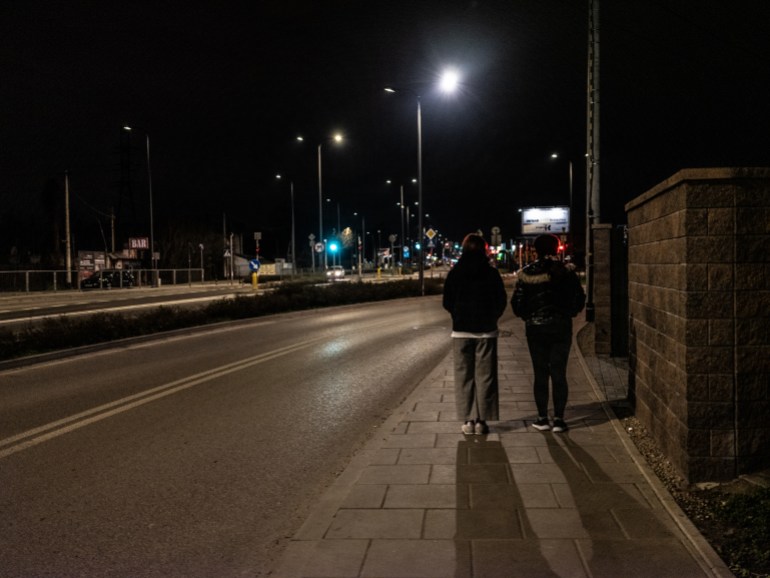Warsaw/Katowice, Poland – Not long after walking through the doors of an employment agency on the ninth floor of a skyscraper in Hong Kong, Stephanie* was captivated by the idea of working in Poland.
Sitting on her bed in her employer’s home later that evening in late 2021, the domestic worker from the Philippines contemplated leaving behind the neon lights of Asia for a brighter future in Europe.
Less than a year later, Stephanie landed in Warsaw, joining the growing ranks of Filipinos filling factories, warehouses, farms, hotels, households and construction sites in Poland.
There, Stephanie’s dream collided with the harsh reality of menial work in the central European country.
After getting a job at a poultry factory in a small town in western Poland, Stephanie was paid just 700 zlotys ($175) for a month’s work, she said, a fraction of the some $1,000 promised to her by recruitment agents.
While Stephanie did not fully understand how her salary was calculated, her employer made deductions to cover her dormitory accommodation, uniform, work shoes, and the application for her Temporary Resident Card, she said.
Stephanie found the work itself gruelling, struggling with the repetitive motions of cutting up frozen chicken parts in the bitter cold and cramped conditions that forced her to hunch her shoulders to avoid brushing up against her co-workers.
To make matters worse, Stephanie’s supervisor would often yell at her and her co-workers, she said, and forbid them from speaking to each other or using the toilet without permission.
Two other Filipino women described similar conditions at the poultry factory.
“One day, I felt like I was about to collapse,” Stephanie told Al Jazeera. “I couldn’t do that job.”
Stephanie’s experiences at two other jobs in the country were not much better.
While working at a factory for plastic toolboxes, she had to walk for an hour each day to reach her accommodation, she said.
“It was very difficult … because you are so tired after standing for 12 hours. Then you need to walk for one hour. You just don’t feel your feet,” she said, showing a video of two workers trudging through a road covered in snow.

Stephanie said she was eventually fired without notice after taking three days off while sick.
She claimed she did not receive her last month’s salary, after being told to sign a document written in Polish that she later realised stated that nothing was owed to her.
One of her next jobs was as a kitchen assistant in Warsaw, where she worked without a contract for about six months. Her monthly salary, paid in cash, came to about 3,500 zlotys ($875), she said.
Stephanie said her employers, who had promised to get her papers in order, then “ran away” without paying her last two pay cheques.
Stephanie’s experiences are not isolated.
As part of a year-long investigation, Al Jazeera spoke to 22 Filipino women working in Poland, almost all of whom claimed to have suffered exploitation or unfair labour practices, including wage theft and unreasonable salary deductions, unlawful termination, passport confiscation, and being forced to sign documents in a language they did not understand.
The majority of the women reported receiving lower salaries than promised by agents who charged them recruitment fees as high as $5,000 – well above limits set by the Philippine government and also at odds with Polish regulations.
Poland has recruited Filipino workers in large numbers in recent years to fill labour shortages stemming from the country’s rapid economic rise and ageing population.
Official data shows that Polish authorities issued 29,154 work permits for Filipino workers last year, up from 2,057 in 2018.
Filipino workers are among those at greatest risk of forced labour in Poland, particularly in industries such as agriculture and hospitality, according to the latest Trafficking in Persons report released by the United States Department of State.
Mikołaj Pawlak, an associate professor of sociology at the University of Warsaw, said the fact that workers’ visas and residence permits are often linked to their employers creates a power imbalance.
While most can look for new jobs, Pawlak said, not all workers are aware of Polish law and those working in remote locations are likely to be more vulnerable.
“The majority of cases are not of trafficking, they involve harsh working conditions … and precarious employment,” Pawlak told Al Jazeera.
“Still, [workers] believe they are OK because they compare it with what they faced in the Philippines or the Gulf states,” Pawlak said, adding that some workers also hold onto the idea of eventually bringing their families to Poland.
‘I need to be patient’
Most workers who spoke to Al Jazeera shied away from filing official complaints, saying they were willing to tolerate unfair labour practices as long as they were not physically mistreated and could send money home.
At least 10 women reported poor conditions in their living quarters, such as a lack of heating and sharing a single toilet with two dozen other workers.
Some alleged that they were denied basic freedoms, such as having to inform their supervisors before going out to buy groceries or attending church.
Others said they had their passport withheld at some point or had to pay 50 zlotys ($12.56) to their employer if they missed a day of work, practices that are included on the International Labour Organization’s list of indicators of forced labour.
Miriam* arrived in Poland in 2019, leaving behind a job at an electronics company in Taiwan, where she received a salary of about $1,250 in addition to other perks.
Lured by promises of higher salaries, she paid about $5,000 to an employment agency in the Philippines.
But since moving to Poland, Miriam has faced language barriers, harsh winters, and strenuous six-day workweeks.
At a car parts factory in southern Poland, Miriam earns 3,000 to 4,000 zlotys ($752 to $1,003) a month under a “mandate contract”, meaning she does not have paid days off or holidays, she told Al Jazeera.
Inside the factory, “we only wear T-shirts. It’s too hot because we need to work fast”, she said, adding that she sometimes makes 1,500 plastic car parts, such as door handles, in a single day.
The 12 hours of standing are only interrupted by two 20-minute daily breaks when Miriam eats white rice and smokes a cigarette – the “best part” of her day.
“I have no choice, so I need to be patient to earn and have a vacation,” Miriam told Al Jazeera.

Rosalinda* shares her resolve.
After three years as a domestic worker in Hong Kong, she applied online for a job in Poland in 2021.
Her first two jobs at food processing plants, where she made about 14 zlotys ($3.54) per hour, came as a shock.
“I was so upset … It’s embarrassing. You pay big money, then you only get this,” she told Al Jazeera, adding that she took a loan to cover her placement fees.
Rosalinda, 51, then became a mushroom picker, often starting at 7am and finishing at 3am the following day.
“I felt very tired and sleepy … it’s dangerous when you’re on the sixth level,” she said, referring to the shelves where mushrooms grow, which workers have to reach by standing on a moving platform.
Rosalinda – who said she was paid about 100 zlotys ($25) per day – eventually quit the job after slipping on the greenhouse’s floor.
She said the company did not provide her with any assistance even though she was not able to walk or sleep properly for a few days.
“You regret coming here to Poland. But then you are here already, so you must find a way,” she said. “You can’t lose hope.”
After a few months without a valid visa or a stable job, picking up work as a part-time dishwasher, pet carer, and cleaner, Rosalinda struck it lucky when a Polish family hired her as a nanny in the summer of 2022.
She was paid 45 zlotys ($11) per hour for eight hours of work a day, had the weekends off, and eventually received a Temporary Resident Card.
At one point, Rosalinda dreamed that her employers might even support her nine-year-old son’s studies in Poland.
But in recent months, they have grown more demanding, she said.
“I am overworked now … instead of having a rest day, they started asking me to work for two to three hours,” Rosalinda said.

Pawlak, the sociology professor, said Filipinos tend to be older and skew female compared with other migrant workers in Poland.
He said some workers turn to Poland as “their second or third choice” due to being unable to meet the higher thresholds and age limits in Western countries.
Most women interviewed by Al Jazeera arrived in Poland directly from other popular migrant worker destinations, such as Hong Kong and Taiwan.
According to a spokesman for Poland’s Ministry of Foreign Affairs, from 2021 to November 2023, 2,980 visas for Filipinos were processed in Hong Kong; 2,969 in Taiwan; and 1,006 in the United Arab Emirates’ Abu Dhabi.
The Philippine labour attache in Prague, Llewelyn Perez, who also handles cases involving workers in Poland, said those migrating via agencies accredited by Manila usually get better contracts and face fewer problems.
Otherwise, “if there [are] violations of the labour agreement, I admit there is very minimal power or authority on [our] part”, Perez told Al Jazeera.
Although Philippine authorities forbid third-country recruitment, overseas workers often cannot afford to return home and wait until their applications are concluded.
According to Perez, her office handled 66 cases involving Filipino workers in Poland last year.
Most of the claims are related to non-payment or salary delays, lack of documentation for legal stay, wrongful termination, and poor working and living conditions.
A spokesman for Poland’s Chief Labour Inspectorate said it received 76 complaints from Filipino nationals between January 2021 and November 2023, 29 of which were considered unfounded.
In addition to conducting workplace inspections, the spokesman said the inspectorate provides training for Filipinos in collaboration with the Philippine embassy in Poland.
In Warsaw, local experts at La Strada, an anti-human trafficking non-profit, told Al Jazeera that Poland’s official structures had not efficiently responded to the growing number of migrant workers and the challenges they faced, adding that court cases involving human trafficking and forced labour often take years to be resolved.
Pawlak, the sociology professor, said the previous Polish government had peddled a negative narrative around migration, despite the country sorely needing foreign labour.
He said he hopes that the new administration, elected in October, will revamp the system and develop a migration policy that better protects workers.
“The state should be a more active player. Not active in the sense of [having] stronger border police and fences on some parts of the border, but more active in regulating migration and labour conditions,” he said.

Facing mounting stress in her nanny job, Rosalinda is weighing her options.
For Miriam, the worker at a car parts factory, the priority is to save enough money to see her family.
This past Christmas was the fifth consecutive year that she spent away from her teenage daughter and husband.
“I did not have any vacation [since arriving in Poland], because the plane ticket is expensive and I have a very low salary,” Miriam said.
Stephanie, who still remembers feeling “excited” about travelling to Europe, cannot help but think that leaving her job in Hong Kong was a mistake.
After a year and a half of pinning her hopes on Poland, she feels more vulnerable than ever.
Currently at a shelter without a work visa and practically no money, Stephanie sees an uncertain future.
“I am illegal now, it’s probably better if I return to the Philippines,” she said.
Raquel Carvalho reported from nine locations across Poland with the support of the Journalismfund.eu
*Names changed to protect privacy.
Read More: World News | Entertainment News | Celeb News
Aljazera










